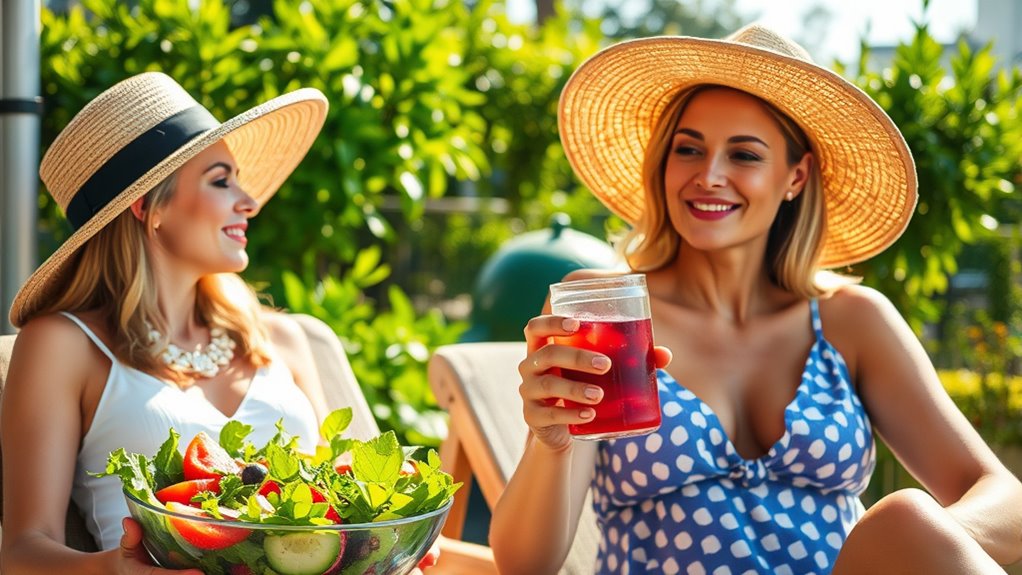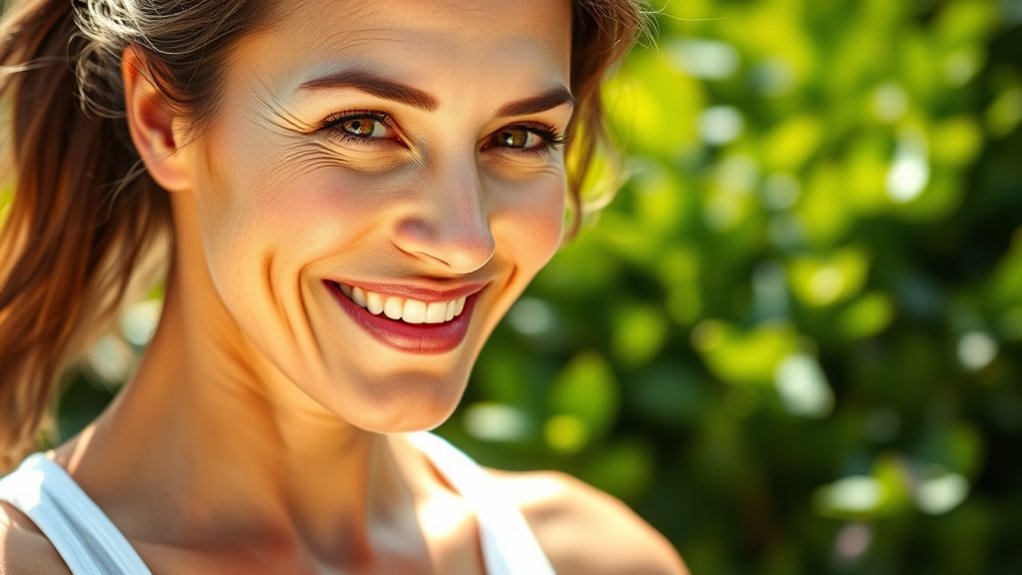Your diet directly impacts how well your skin can handle UV exposure. Eating nutrient-rich foods like berries, leafy greens, and nuts boosts your skin’s defenses by providing antioxidants that neutralize harmful free radicals. Proper nutrition also supports repair and maintains a strong barrier, reducing sunburn and signs of aging. Focusing on your diet can strengthen your skin’s resilience over time, so keep exploring ways to improve your nutrition for better UV tolerance.
Key Takeaways
- Consuming antioxidant-rich foods helps neutralize UV-induced free radicals, reducing skin damage.
- A balanced diet supports skin’s barrier function, making it more resilient to UV exposure.
- Proper nutrition enhances skin’s ability to repair damage caused by sunlight.
- Hydrating foods and healthy fats maintain skin elasticity, decreasing sunburn risk.
- Consistent nutrient intake strengthens overall skin health and improves UV tolerance over time.

Your diet plays a more important role in your skin’s ability to withstand UV exposure than you might think. What you eat directly influences how well your skin can protect itself against the harmful effects of the sun. When you consume foods rich in essential nutrients, you enhance your skin’s resilience by improving nutrient absorption, which is critical for maintaining healthy, protective skin layers. Proper nutrient absorption ensures your skin gets the necessary building blocks to repair and defend itself after UV damage. Without it, even a balanced diet won’t provide the full benefits, leaving your skin more vulnerable to sunburn, premature aging, and other sun-related damage.
Your diet influences your skin’s UV resistance and ability to repair sun damage.
Dietary antioxidants are particularly indispensable in boosting your skin’s UV tolerance. These compounds neutralize free radicals generated by UV rays, preventing oxidative stress that damages skin cells. Foods high in antioxidants, like berries, dark leafy greens, nuts, and colorful vegetables, supply your body with powerful molecules such as vitamin C, vitamin E, and polyphenols. Consuming these regularly can strengthen your skin’s defenses, reducing inflammation and helping repair cellular damage caused by sun exposure. This is why a diet rich in antioxidant-rich foods can be a natural, effective way to support your skin’s protection from the inside out.
Incorporating these nutrients into your diet doesn’t mean drastically changing your eating habits overnight, but it does mean making smarter choices. For example, adding berries to your breakfast, snacking on nuts, or including leafy greens in your meals can noticeably boost your antioxidant intake. These foods not only provide essential vitamins but also promote better nutrient absorption, ensuring your skin benefits fully from what you consume. When your body efficiently absorbs nutrients, your skin’s barrier becomes stronger, less prone to UV-induced damage, and better equipped to recover from sun exposure.
It’s also worth noting that a balanced diet supports overall skin health, which indirectly influences UV tolerance. Proper hydration, healthy fats, and sufficient protein contribute to maintaining skin elasticity and moisture, making your skin less susceptible to sunburn and aging. So, focusing on nutrient-dense foods isn’t just about antioxidants — it’s about creating an environment where your skin can thrive and defend itself effectively. Ultimately, your diet acts as a foundation for your skin’s resilience, and making mindful choices can make a noticeable difference in how well your skin withstands UV rays over time.
Frequently Asked Questions
Can Specific Foods Improve Skin’s Resistance to Sun Damage?
Yes, certain foods can boost your skin’s resistance to sun damage. Consuming foods rich in food antioxidants helps protect your skin cells from UV harm, while vitamin C supports collagen production and skin repair. Include citrus fruits, berries, and leafy greens in your diet to enhance your skin’s natural defenses. By nourishing your body with these nutrients, you can improve your skin’s resilience against sun-induced damage.
Do Supplements Enhance UV Protection Better Than Diet Alone?
Supplements like antioxidant supplements and herbal extracts can enhance UV protection, but they shouldn’t replace a healthy diet. While these supplements can provide concentrated nutrients that combat free radicals and support skin repair, your diet offers a broader range of nutrients essential for overall skin health. Combining both—eating nutrient-rich foods and taking targeted supplements—gives you the best chance to boost your skin’s resilience against sun damage.
How Quickly Can Dietary Changes Affect Skin’s UV Tolerance?
You can notice changes in your skin’s UV tolerance within a few weeks of improving your diet, especially with consistent nutritional timing and dietary consistency. Eating foods rich in antioxidants and vitamins like C and E helps bolster your skin’s defense. However, for lasting benefits, stick with healthy habits over time. Regularly updating your diet ensures your skin remains more resilient against UV damage, maximizing your protection effectively.
Are There Any Foods to Avoid for Better Sun Protection?
You should avoid foods that trigger food sensitivities or cause nutrient deficiencies, as these can weaken your skin’s ability to protect against UV rays. Limit processed foods, excess sugar, and alcohol, which may impair skin health. Instead, focus on nutrient-rich options like fruits, vegetables, and healthy fats. Keeping your diet balanced helps maintain your skin’s resilience, reducing the risk of damage from sun exposure.
Does Hydration Influence the Skin’s Ability to Withstand UV Rays?
Hydration effects your skin’s ability to withstand UV rays by maintaining skin moisture, which keeps your skin resilient. When you stay well-hydrated, your skin remains plump and less prone to damage from sun exposure. Proper hydration also helps your skin repair itself faster after UV damage. So, drinking enough water daily is essential for boosting your skin’s natural defense, making it better equipped to handle the sun’s harmful rays.
Conclusion
By now, you realize that what you eat can dramatically boost your skin’s UV tolerance—like giving it a superhero shield against the sun’s harshest rays. Incorporate antioxidant-rich foods and stay mindful of your diet to make your skin stronger and more resilient. Remember, your plate holds the power to transform your skin into an unstoppable fortress, protecting you from sun damage and aging. So, fuel wisely, and watch your skin become an invincible force!









